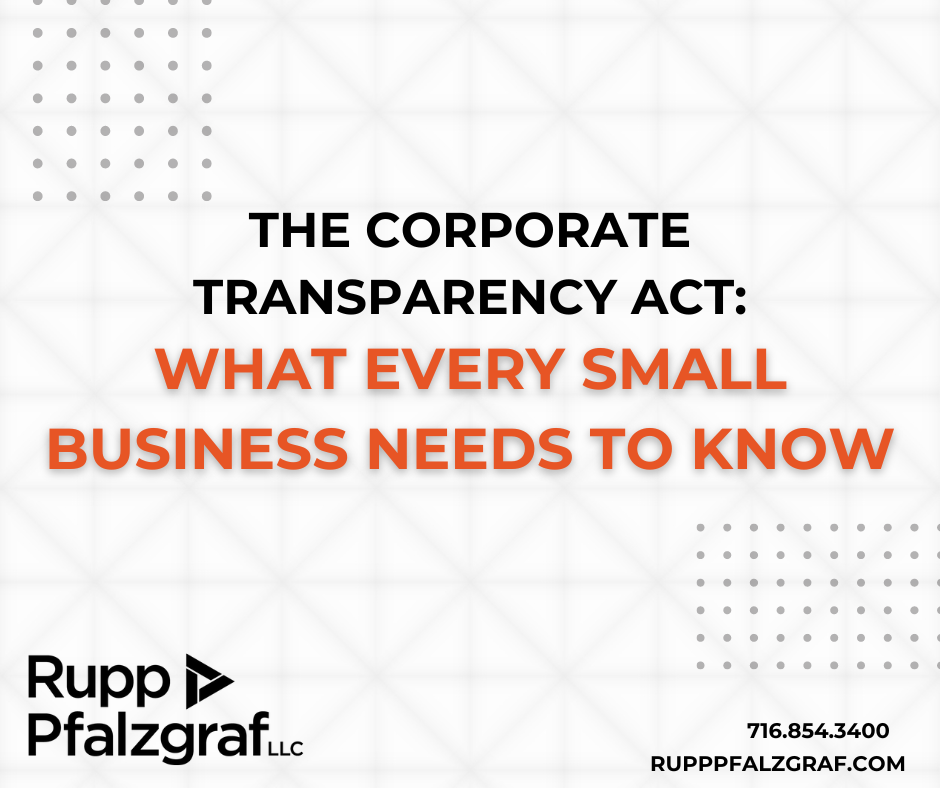
The new Corporate Transparency Act may require your business to report information about its ownership to the Financial Crimes Enforcement Network (“FINCEN”), a branch of the U.S. Treasury. Knowing the complexities of this act and its impact is essential for your small business. To help our friends and clients review their obligations under the new law, Rupp Pfalzgraf has put together this brief “frequently asked questions” announcement.
Under the new law, each and every entity operating in the United States is required to review its own operations to see if it is required to report to FINCEN, or whether it can rely on one of the 23 exceptions to the new law. Compliance with the new law is mandatory, and businesses may face a fine of up to $500 per day for failing to comply with the law, and potential criminal exposure for willful failures to report.
Which companies need to report to FINCEN under this new law?
Any entity formed or operating in the United States needs to review its operations to see if it is required to report, or whether it can fall into one of the “exceptions” to the new law.
If I need to report, what needs to be included?
Demographic information about the entity itself, PLUS information for any individual who either directly or indirectly: (1) exercises substantial control over the reporting entity, or (2) owns or controls (either directly or indirectly) at least twenty-five percent (25%) of the entity’s ownership interests.
What is substantial control?
Anyone who is a senior officer (regardless of ownership), has authority to appoint or remove officers or directors, or is an important decision-maker for the reporting entity.
What information will an entity have to report to FINCEN?
A reporting entity will have to report:
- its legal name;
- any trade names or formal assumed names;
- the current street address of its principal place of business, or, for foreign companies the current address from which the entity conducts business in the United States;
- its jurisdiction of formation or registration; and
- its Taxpayer Identification Number (or, if a foreign reporting entity has not been issued a TIN, a tax identification number issued by a foreign jurisdiction and the name of the jurisdiction).
What information will a reporting entity have to report about its owners?
For each individual who is a beneficial owner or exercises substantial control, a reporting entity will have to provide the following:
- the individual’s name;
- date of birth;
- residential address; and
- an identifying number from an acceptable identification document such as a passport or U.S. driver’s license, and the name of the issuing state or jurisdiction of identification document, ALONG WITH an image of the identification document used to obtain the identifying number
Am I exempt from the reporting requirement?
Maybe. Twenty-three (23) types of entities are exempt from the beneficial ownership information reporting requirements, ranging from publicly traded companies meeting specified requirements, insurance carriers, nonprofits, and the most common exception: “Large Operating Company”. Under the law, a Large Operating Company must satisfy each of the following:
- have twenty (20) or more full-time employees inside the United States, without consolidating employees across multiple companies; and
- a physical operating presence within the United States; and
- filed a Federal Tax Return (IRS Form 1120, 1120-S, or 1065) showing more than Five Million ($5,000,000) in gross revenue (including in consolidated filings) from inside the United States.
Do I have to file annually?
No. There is no annual reporting requirement, you only need to file updates or corrections when necessary.
Can a parent file a single report on behalf of its group of entities?
No. Each entity is required to review its own operations to determine whether it is required to file its own report with FINCEN, except that a wholly owned subsidiary of an exempt entity may rely on its parent entity’s exemption.
What if my entity becomes exempt after already filing a report?
If an entity filed a report with FINCEN but then becomes exempt, it can file an updated report indicating that it is no longer a reporting entity. An updated report for a newly exempt entity will only require that: (1) the entity identify itself; and (2) check a box noting its newly exempt status.
How does the New York State Transparency Act Differ?
Beginning in December, 2024, all LLCs must file a similar report with the New York Secretary of State, except that the report must be physically signed by a member or manger of the LLC. The New York Act, notably, applies only to LLCs. Corporations and other business entity types are exempt as of the date of this letter. LLCs that are exempt still must file a signed form indicating which exception they are relying upon in claiming their exception. As of the date of this letter, this filing will become a public record.
For more information on the Corporate Transparency Act – check with your attorneys at Rupp Pfalzgraf, or the Financial Crimes Enforcement Network directly. FINCEN’s own FAQ section is viewable here – https://www.fincen.gov/boi-faqs

